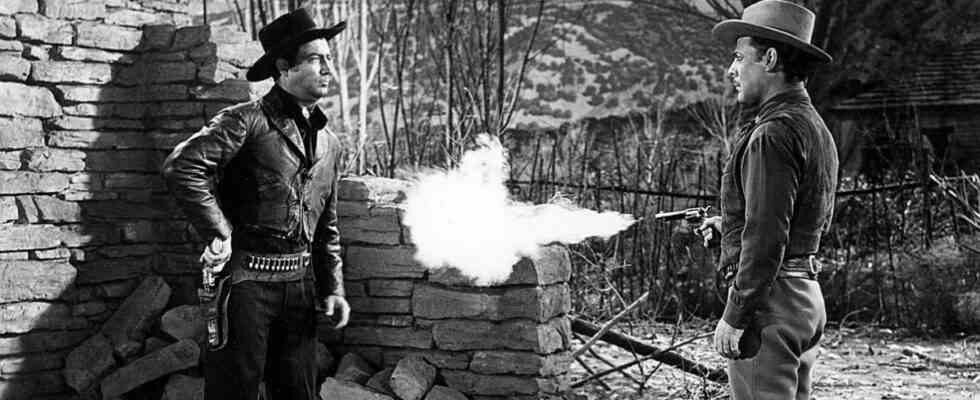It’s hard to believe who all once dueled with more, less or no luck, Bismarck or the unfortunate labor leader Ferdinand Lassalle, Leo Tolstoy or the great Alexander Puschkin, and many more. Neither Puschkin nor Lassalle saw the duel as anything other than a kind of attempted murder out of injured honor. Honor of this kind, which can be belittled with alleged insult, is already a special fad of exaggerated masculinity, which originally arose from the quarrels of the medieval nobility. Detective assistant Sandler explains the three degrees of insult to his chief inspector Tannenschmidt: “First degree, that’s just rudeness, a violation of manners… The second is an insult. Strong language. Insinuations. False allegations.” The colleague is surprised: “Then we would have a thousand duels every day in Berlin if these rules were still in force…” That’s how it is, and then there is the third level: “Strike. Touching is also a stroke everything else: slaps, kicks, jostling. And… seduction of a woman, wife, lover, sister!” There are no limits to the madness.
Rayk Wieland, born in Leipzig in 1965, has tried his hand many times as an editor and writer, and his novel “Insult to the Third Degree” turns into an obsession: the antiquarian Alexander Schill feels attracted to the psychiatrist and sleep coach Oskar Markov, the erotic successor to his ex-lover Constanze Kamp, so unforgivably challenged that he sees no other solution than a duel. Markov reports this truly untimely demand for a duel to the police. Chief Inspector Tannenschmidt and her assistant Sandler try to make sense of this grotesque.
Schill, on the other hand, immersed himself deeply in the history and importance of dueling in order to always gain new motives for his crazy undertaking: “A duel, as he understood it, was nothing more than a short, last conversation between two people who have nothing to say to each other.” In order to reconstruct it, Wieland and his antiquary set out meticulously on the traces of the last duel on German soil, which took place in Hohenlychen in 1937 between the special rapporteur of the national observer, Roland Strunk, who was also an SS Hauptsturmfuhrer and Hitler’s favorite journalist, and Baldur von Schirach’s personal adjutant, Horst Krutschinna, who was also an Obergebietsfuhrer.
Rayk Wieland: Third degree insult. Novel. Kunstmann, Munich 2022. 365 pages, 24 euros.
Hohenlychen, about 50 kilometers from Berlin, was a place heavily contaminated by the Nazis: the terrible SS doctor Karl Franz Gebhardt was in charge of the sanatoriums here. Many SS greats were treated there and perceived Hohenlychen as a kind of health resort, while Gebhardt also conducted the most horrific medical experiments with concentration camp prisoners from Ravensbrück and later also in Auschwitz. Among other things, he was sentenced to death in 1946 in Nuremberg at the doctors’ trial and executed in 1948. Heinrich Himmler, a close friend of Gebhardt, and Rudolf Hess, Leni Riefenstahl and the NS cultural functionary Ernst Schulte Strathaus and several other NS charges, Wieland had perversely murderous NS entertainment performed at social evenings, as various documents show. The men with lewd dash, the women with fatal boldness. After all the preparations and rites for the correct course of this honorary transaction had been carried out in accordance with the regulations, a duel ensued in which Krutschinna, who was notorious as Hallodri, shot Hitler’s favorite Strunk. Outraged by this, Hitler forbade such nonsense as a matter of principle.
The way Wieland tells the real duel, the circumstances that led to it, and its protagonists with sarcasm that is as evil as it is illuminating and combines it with the fictitious obsession with duels of the monomaniac antiquarian Schill, yes, cleverly pushes both levels together, is what makes this book so appealing . It may be a little difficult to get into at first, because the thought of duels seems to have disappeared really far away and deep in the past, but the novel is all the more captivating when the idea fixethat runs through this narrative work begins to have an effect on the reader: dueling as the most consistent form of an ultimate conversation.
While the inspectors can’t shake the feeling of investigating the improbable, Schill searches for the original weapons of the Strunk-Krutschinna duel. In an almost tragi-comic manner, Markov tries to avert the absurdity of the possible duel that is nevertheless approaching ever more menacingly. But at some point, despite the work of the commissars, Schill and Markov face each other in a tunnel at night and raise those ominous weapons from 1937.

